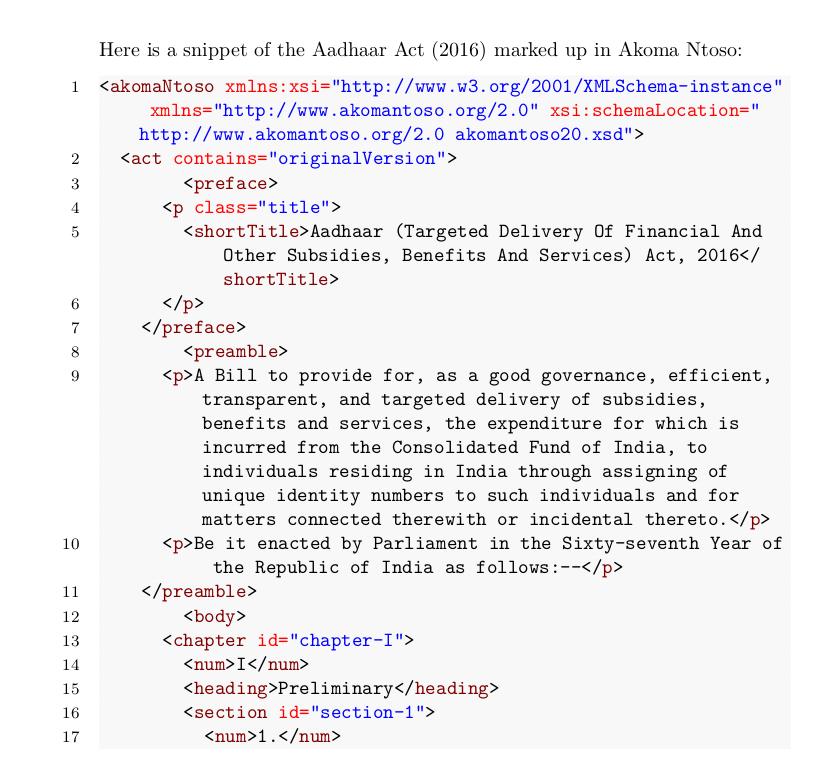Why Parliament
(and Other Lawmakers)
Should
❤️
Open Standards
Presented on 2019-10-11, at IIAS for the "Exploring Policy Issues in the Digital Technology Arena" workshop organized by NIPFP.
Pranesh Prakash
Fellow
Centre for Internet and Society
Affiliated Fellow
Information Society Project, Yale Law School
2019 Public Interest Technology Fellow
New America
CC-BY-SA 4.0: (copy, share, adapt: sharing is caring)
no proprietary standards or software were used in the making of this slide deck
Parliamentary Data
Much better availability of documents than other parts of the government.
Not open data, not open standards.
Architecture, Search, Formats
Parliamentary Data
Kinds of Records
- Debate Records (with speaker’s and members’ names and timings)
- Voting records, vote counts, and quorum counts
- Questions and answers, including corrections
- Bills and acts + amendments
- Subordinate legislation + amendments
Parliamentary Data
Kinds of Records
- Committee meeting records
- Committee reports, including dissents
- Resolutions, references, announcements, statements, and special addresses
- Secretariat's reports (e.g., summary of work reports)
Parliamentary Data
Kinds of Records
- Reports of elections, inductions, and resignations, and deaths of members
- Rules of procedure and conduct of business
- Stand-alone books, pamphlets, and reports
Technology Use Within Parliament
Lok Sabha
2016:
“Presently, a digitization project is under progress for creation of PDF files of the proceedings of Lok Sabha, including Questions and Debates. . .”
Technology Use Within Parliament
Rajya Sabha
2017:
-
“Using the Internet for research”
-
Communications being “sent through email”
-
“Soft copies” being emailed
-
“All typing work” being “done on computers”
Technology Use Within Parliament
NIC: "Parliamentary Information Division"
Data.gov.in: Even information already digitized isn't available.
Open Standards
I ❤️ Akoma Ntoso
(and so should you)
Open Standards
Who uses Akoma Ntoso?
UN, Kenya, EU, South Africa*, UK, etc.
Open Standards
Cui bono?
-
Parliamentarians (!)
-
Bureaucrats (!!)
-
Researchers
Open Standards
How does it help?
Authenticated electronic life cycle
(the "official version" problem)
Open Standards
How does it help?
Producing revisions
(Creating amendments are hard!)
Tracking changes
(Redlining + Across laws)
Open Standards
How does it help?
Dated versioning
(What was the law on October 14th 1985?)
Open Standards
How does it help?
Complex research
(Structured data)
Open Standards
What does it look like?

Open Standards
What does it look like?

Laws, Policies, Judicial Orders
Copyright
ss.52(1)(q) & (r)
Bangladesh (ss.16, 17) vs. Pakistan (s.57(1)(q))
Laws, Policies, Judicial Orders
Copyright
EBC v. Modak
(judgments = "public domain")
Laws, Policies, Judicial Orders
Standards
Vansh Sharad Gupta v. Union of India
Laws, Policies, Judicial Orders
Standards
(Central vs. State)
National Policy on Open Standards
National Data Sharing and Accessibility Policy
Interoperability Framework for e-Governance
(Open Fonts Format + Unicode)
How Much Will This Cost?
Parliament budget:
0.049% of budget
(10% of global average)
Costs involved:
Proof-reading, digitization, software, ongoing training.
Cost:
USD 2-5 million
(<5% of single year's budget)
Other Institutions?
Perhaps Parliament / Legislative Assemblies aren't the right place to begin?
-
RBI (ReBIT)
-
CBIC
-
CBDT
Contact Details
pranesh@prakash.im
@pranesh

I would love detailed feedback on the paper, or any help in taking this work further.
Why Parliament & Researchers Should <3 Open Standards
By Pranesh Prakash
Why Parliament & Researchers Should <3 Open Standards
Presentation made at IIAS on October 11, 2019, at an NIPFP-organized conference.
- 1,477



